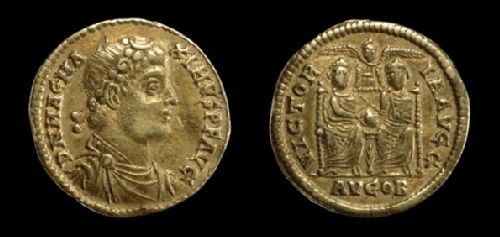Coining in Roman Britain Part 6: One Last Hurrah
Over half a century after the closure of the London mint, there is evidence to suggest it may have been opened one last time. Another usurper, Magnus Maximus, rebelled against the legitimate emperor Gratian in AD 383. He took legions from Britain, and ultimately fought and killed Gratian a few months later. One might suspect that he struck coins in Britain to pay his troops. Amazingly, a handful of extremely rare gold solidi and silver siliquae featuring the mint-mark AVGOB and AVGPS have been discovered. It is now believed that these marks refer to London’s new fourth century name – Londinivm Avgvsta, with the OB and PS referring to the pure gold and pure silver of the issues. These coins are so rare that none have yet been recorded on the PAS database. These are the last coins known to have been struck at the London mint. Money would not again be struck in London until the medieval period.

Extremely rare gold solidus of Magnus Maximus, struck at London. The reverse depicts Magnus and his son, Flavius Victor, with the inscription VICTORIA AVGG (the two Gs representing the two emperors). © The Trustees of the British Museum.
Through over 400 years of Roman control, it is clear that large numbers of coins were minted in Britain. Many of these were, however, contemporary copies, struck either for necessity purposes, or less honest uses. It is only by the late third century that coins are struck en-masse in Britain. Around 100 years later the last coins were stuck, by another usurper, and following this short and rare issue of coins, Rome’s London mint would fade into history, its existence forever immortalised through its products.

Table presenting the mint marks of the London mint over time. © author.

This month's coin series on Roman Britain is written by Dom Chorney, a young numismatist from Glastonbury, Somerset. He studied for his undergraduate degree at Cardiff (in archaeology), and achieved a 2:1. Dom is currently studying for an MA in Ancient Visual and Material Culture at the University of Warwick, and intends to undertake a doctorate in 2015. His main areas of interest are coin use in later Roman Britain, counterfeiting in antiquity, coins as site-finds, and the coinage of the Gallic Empire.
 Clare Rowan
Clare Rowan


 Loading…
Loading…
Add a comment
You are not allowed to comment on this entry as it has restricted commenting permissions.